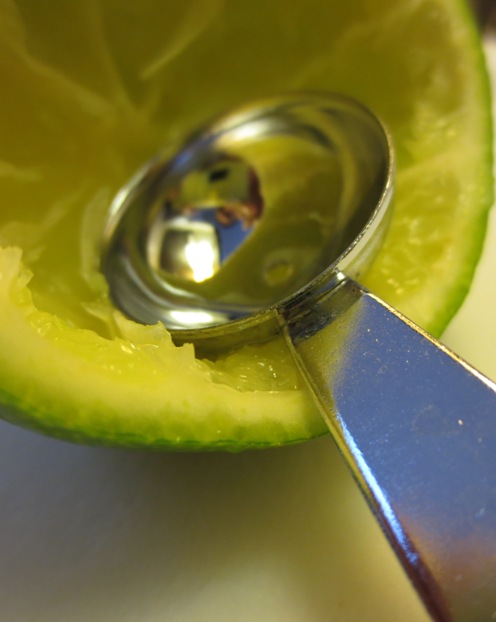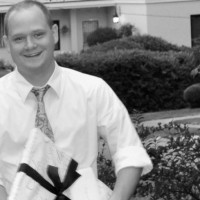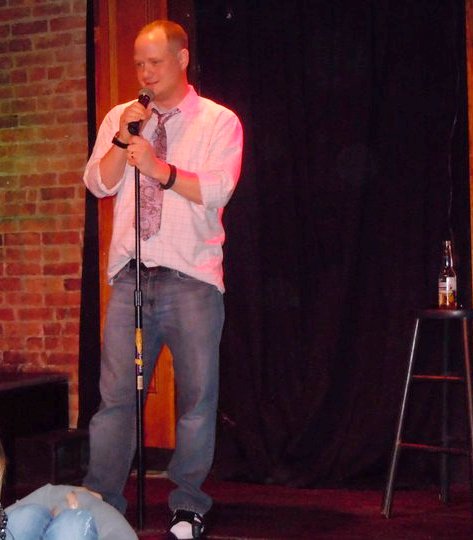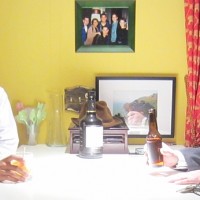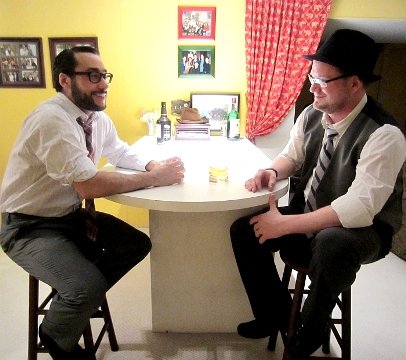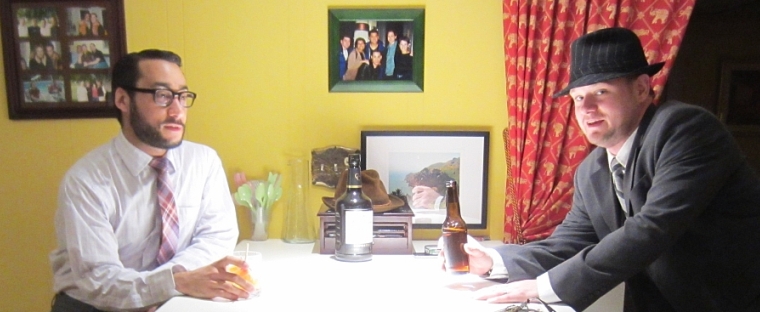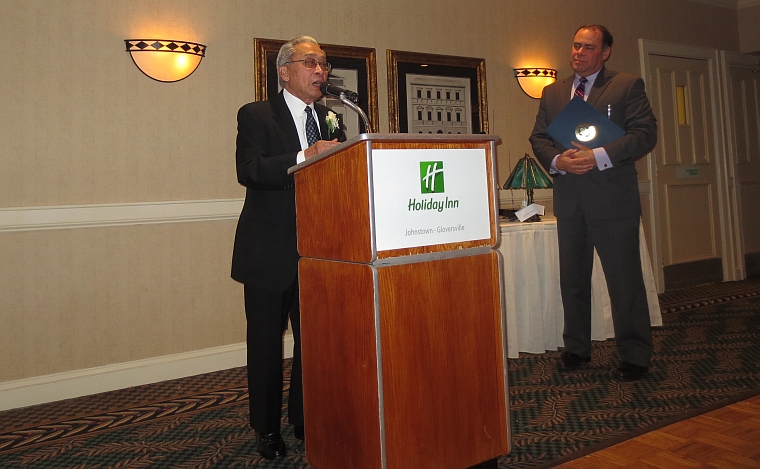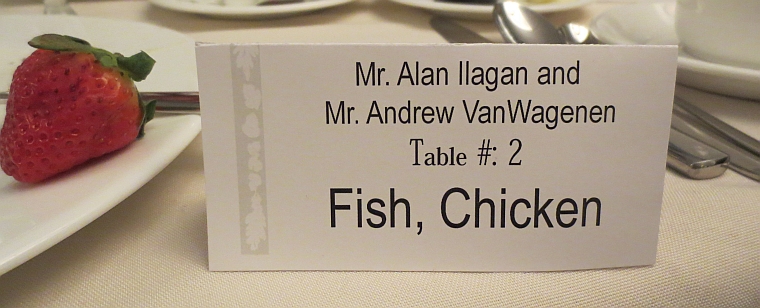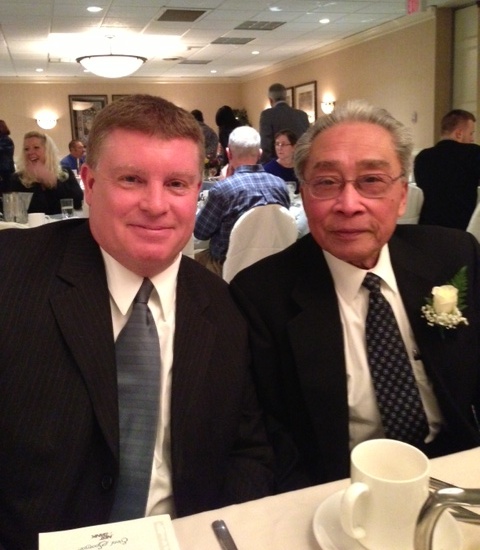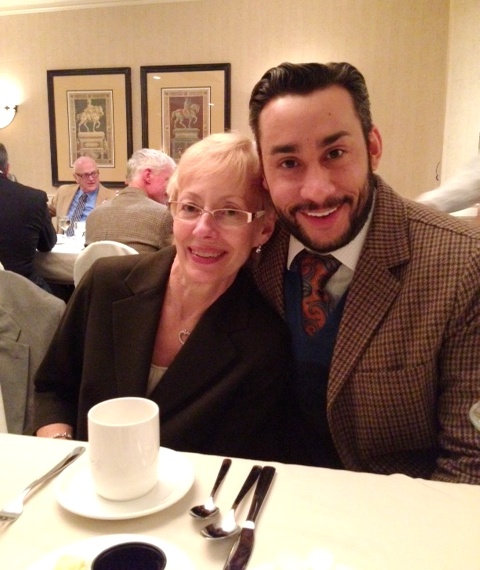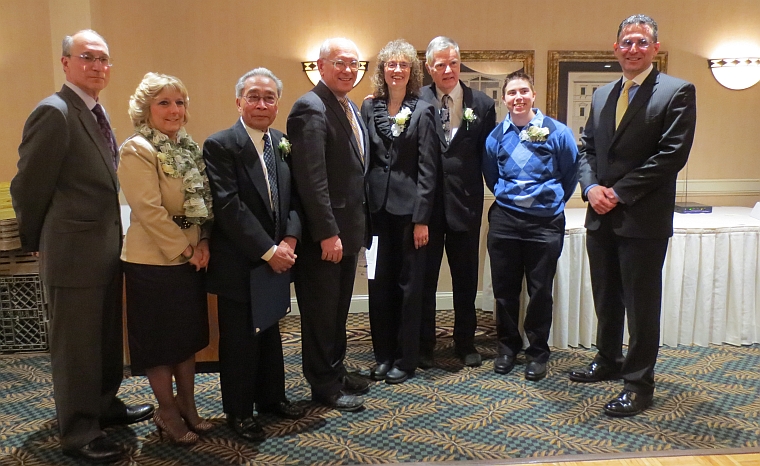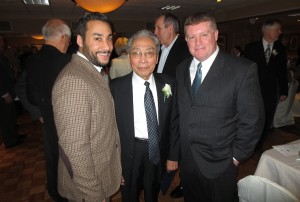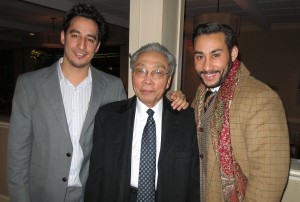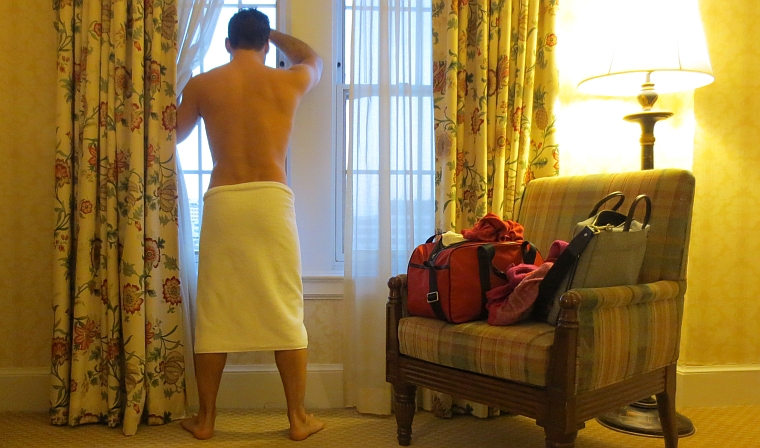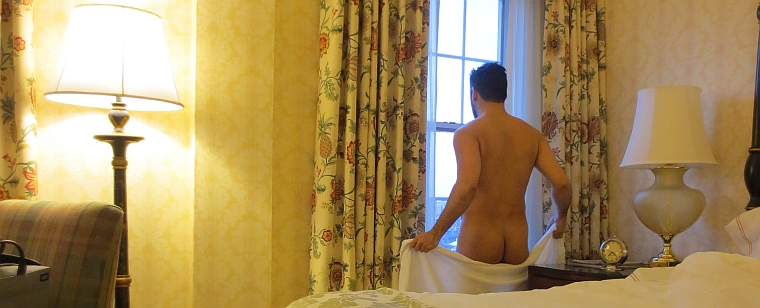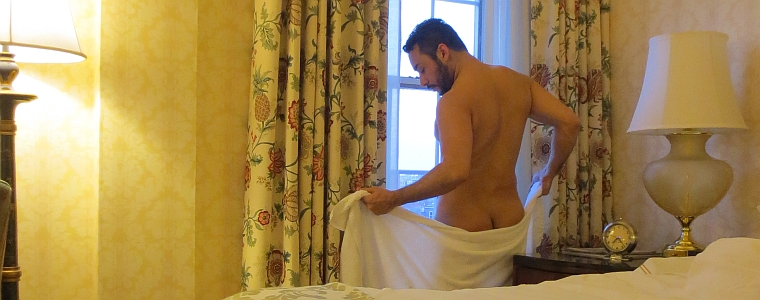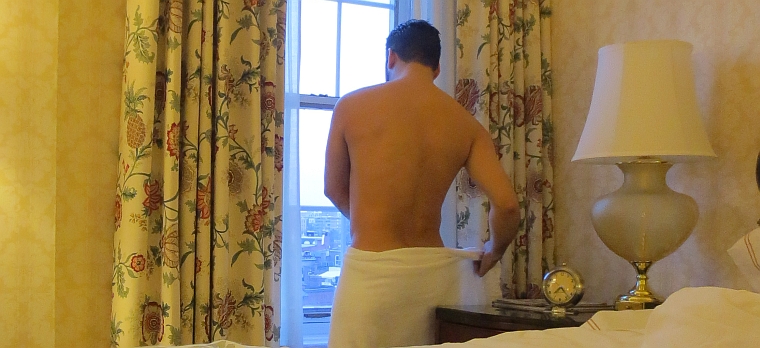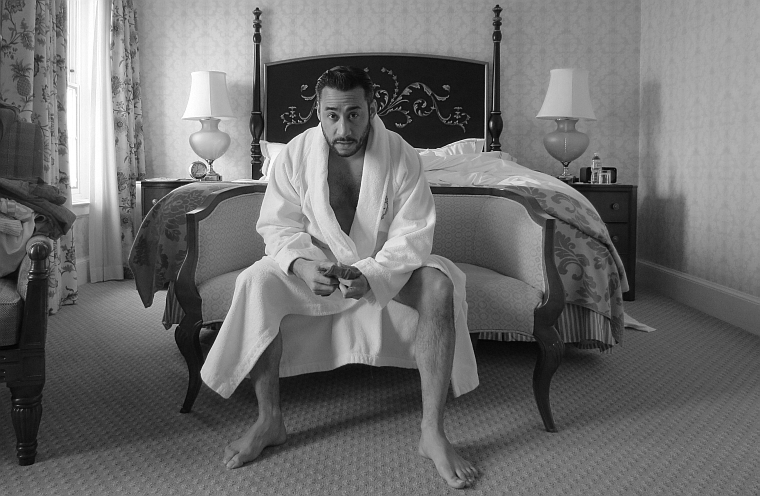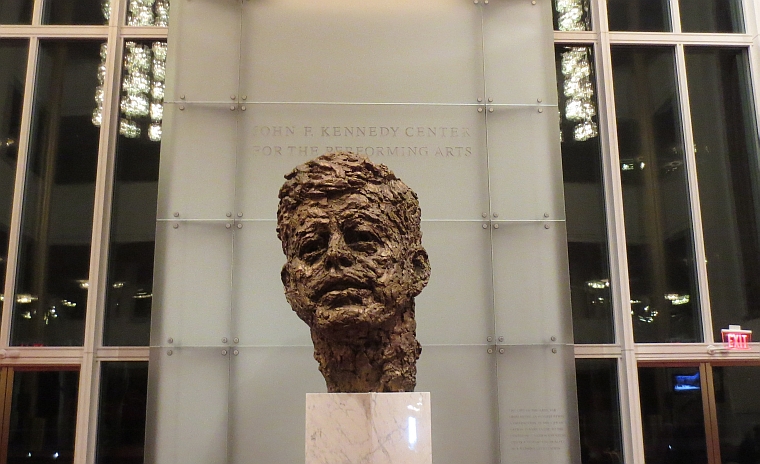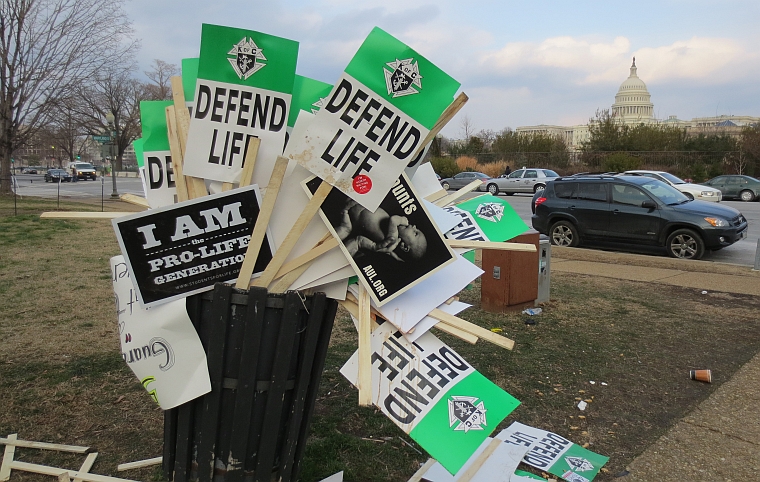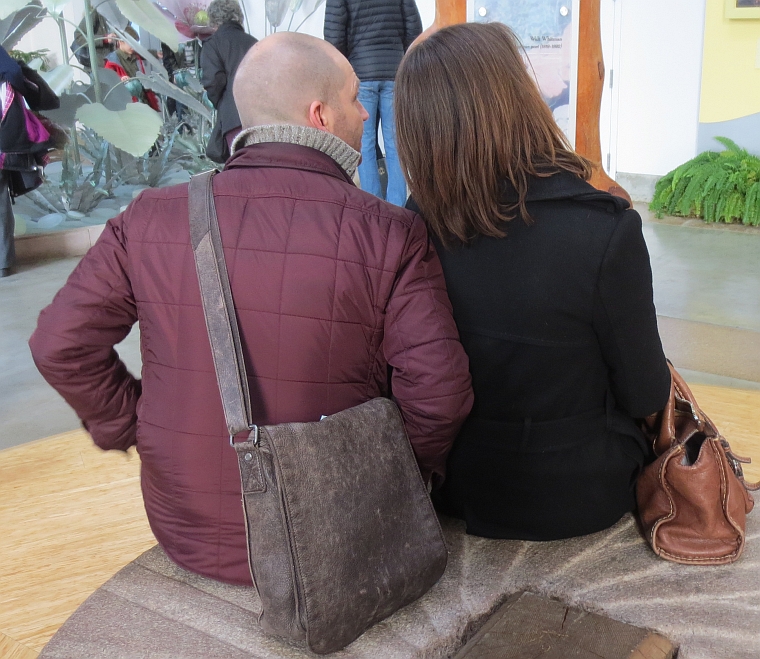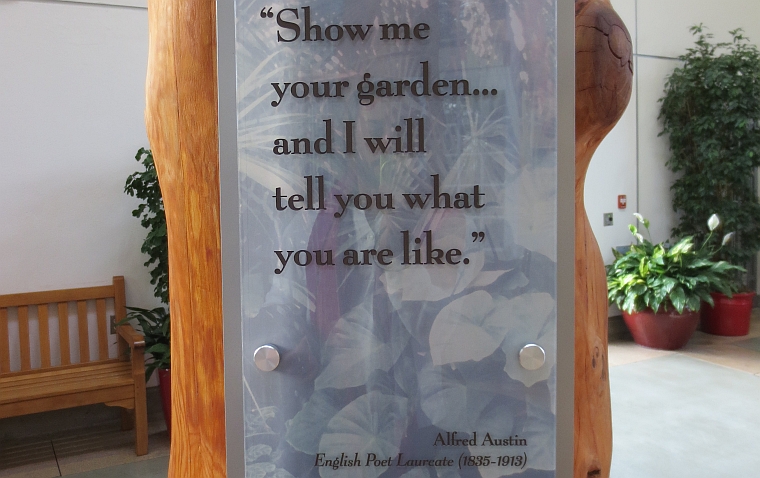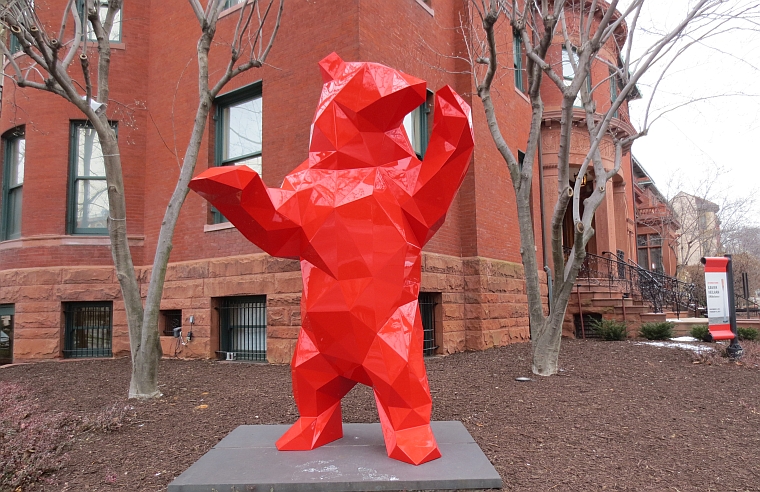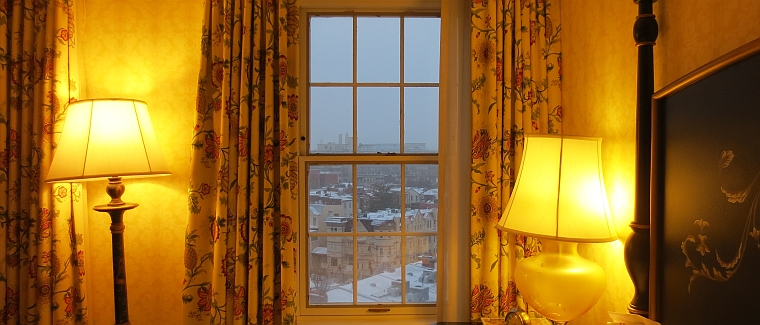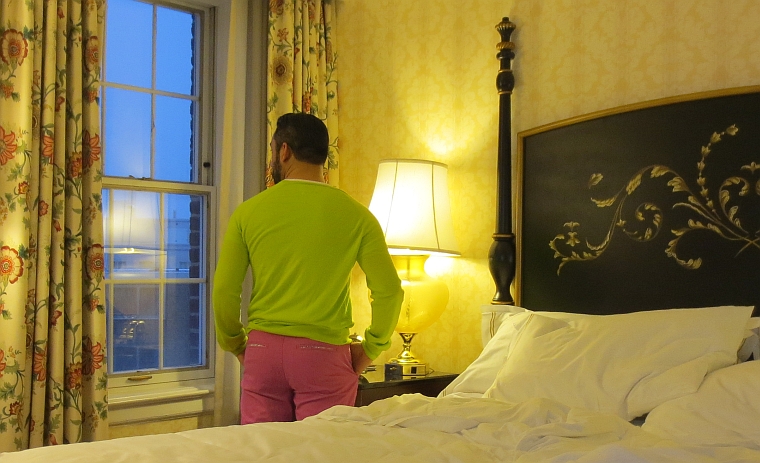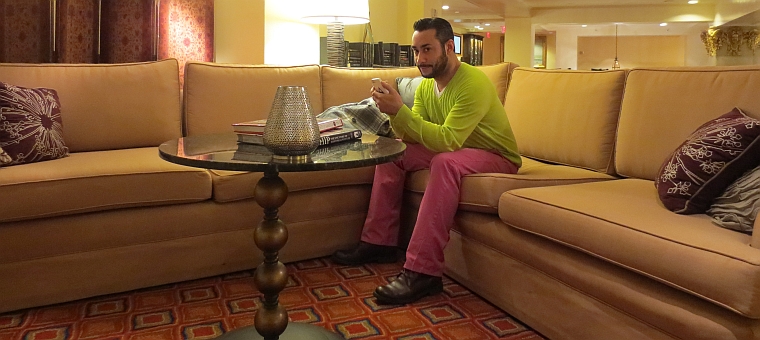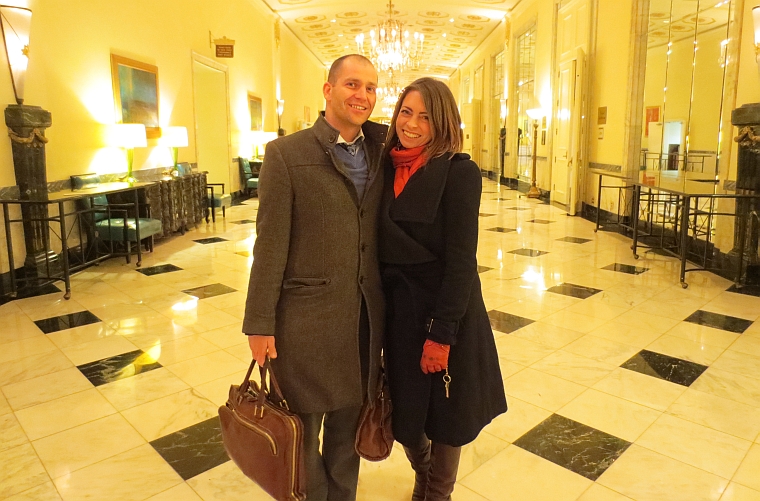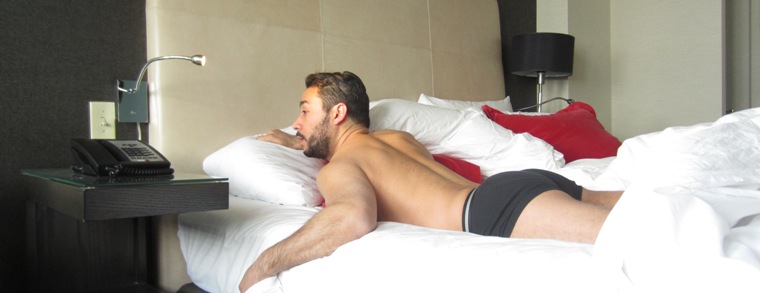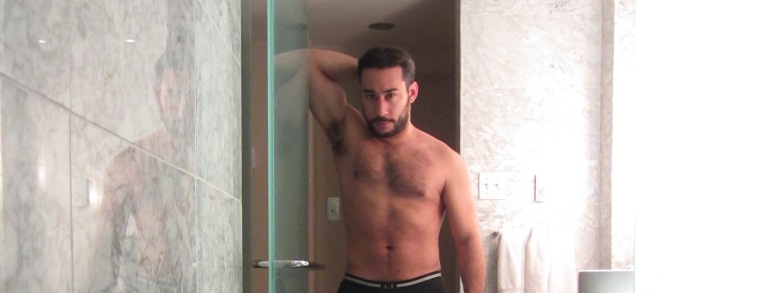The man sits in the midst of a sea of young girls and a smattering of their gay pals, yet he is alone. It is the 10:20 showing of ‘The Hunger Games’, and a solo gentleman in a baseball cap courting his mid-thirties may make for a suspicious visage to some, but he is relatively unfazed. He checks his phone, as much out of habit as self-conscious distraction, and fires off a quick FaceBook post, both betraying a sophomoric excitement and self-deprecating belittlement of his attendance at such a movie. There’s a certain respect that must be given to those who can retain a sense of boyhood wonder, as well as those with the self-possession to see such a movie alone. That sort of self-possession is why some straight guys don’t have a problem with gay men. It takes a secure, confident, and sure-of-himself guy to not pause at the notion of hanging out with guys who are attracted to other guys. It takes a brave and courageous man to not fear being called or considered ‘gay’ when stepping out of traditionally masculine roles. And it takes a guy with an impressive sense of self to so closely and fiercely align himself with fighting for equality for all. In this premiere installment of the straight ally series, Skip Montross is that guy.
Most of my straight male friends, and more than a few of the gay ones, simply don’t have that kind of confidence. Sometimes I don’t even have that confidence. Luckily, there are people like Skip who have enough for the rest of us, who inspire us to find that confidence within ourselves, empowering us with their vision of equality. These are our allies ~ the formidable straight people who realize that this is their fight too, the fight for a better world.
They don’t need to do it, but they realize that it’s the right thing to do, that to stay silent is its own form of oppression, and that acquiescence can be a crime in itself, and a more insidious one at that. Skip understands this, and explains his views with passionate reason, making irrefutable points grounded in disciplined intelligence, all the while speaking from the heart:
“You ask why this means a lot to me and I say that it’s for the same reason that it SHOULD mean a lot to everyone; because it is right, because it is just, and because it is fair. Take a good look at our history. Study it well. The heroes whose names we all learn as school children are always those who championed the rights of a minority against the aggressive opposition of those who preached contempt, division, and often hate under the guise of false righteousness. Likewise, the passage of time and the clarity of hindsight is never kind to those who fire-walled progress. Rather, it shines a spotlight on their ignorance and bigotry. Martin Luther King Jr.’s defining quote may well be, “I have a dream that my four little children will one day live in a nation where they will not be judged by the color of their skin but by the content of their character… Governor George Wallace, I draw the line in the dust and toss the gauntlet before the feet of tyranny, and I say segregation now, segregation tomorrow, segregation forever. Which side of history are you willing to place yourself upon? We are at this place again, having taken far too long to get here. America is ridding herself of an unsightly scar. The process is long and painful but wholly worthy.”

“It is assured that the generations that follow us will view the voices of today, those who say that traditional marriage is a right reserved for only straight couples, with the same bitter disdain that we reserve for those who believed that separate could ever be equal… That is why it means so much to me… not because I benefit but because it is right… I feel the need, nay the duty, to stand up to radical ignorance and hypocrisy. It boils my blood when individuals, or collectives of a like minded ignorance, stand behind obscure passages in the bible and use them as an armor of righteousness with which to cloak and shield their transparent and hateful bigotry. It is reckless and woefully misleading when someone quotes biblical passage as a justification to oppose gay marriage. There are so many philosophical and ideological miscarriages when using the bible as a defense of marriage that it boggles the mind. Freely they cite Leviticus 20:13 as, “If a man also lie with mankind, as he lieth with a woman, both of them have committed an abomination” as they preach it to the heavens. Yet they freely dismiss the abomination levied upon those who dare eat shellfish or get a tattoo? Protest a gay marriage? “Where and when do we show up.” Protest a Red Lobster? “Aww but man, they have the best cheddar biscuits.” It’s this kind of hypocrisy that tears at me with vicious claws. Clearly, adherence to the bible is flexible enough to ignore instructions that are inconvenient, such as murdering one’s children for disobedience, but when it’s convenient to justify hate… well then it’s gospel. It’s the ultimate in passive aggressive bigotry. If you’re afraid of gay people… we get it. If lesbians creep you out… that’s fine. Just stand up and have the courage to fucking say it. Hiding behind an obscure passage makes you not only a homophobe but a weak one at that.”
In this era of political-correctness, it’s refreshing to find someone so willing to simply state it, to call out the bigots and name the hypocrisy ~ because, really, that’s what it is: bigotry and hatred. It takes a lot to put that out there, and most of us are too insecure of what might be said back to us to stand behind it. It took Skip a while to reach that point too.
“Like most adolescents and young adults, I wasn’t always supremely confident in myself,” he recalls. “A teenage boy who admits that he cries at earnest and touching character films can take a lot of slack from friends and cliques. While I always knew what I liked, I was sometimes afraid of being honest based on what others might think. I feel like I completely grew into myself somewhere in my early to mid twenties. It was at that point when I realized that I know exactly who I am through and through. I sometimes get the feeling that not everyone enjoys that benefit. I think that once you truly know who you are you find that, with the exception to those that you love and hold close, you couldn’t care less what anyone else in the world thinks. I am a nearly-35-year-old husband and Dad who has been going bald for as long as anyone can remember, who enjoys watching ‘So You Think You Can Dance?’ and singing songs from ‘Wicked’ just as much as I enjoy giving fantasy football advice while fixing your computer. I am who I am and I like what I like. Thus, I am afforded the ability to speak loudly about that which I hold true.”

That ability also gives him the bravery to sit alone at a showing of ‘The Hunger Games’, as we return to the original scene of this piece. The movie nears its final stretch, and the clock closes in on midnight. At home, his wife and daughter rest in peaceful slumber. A son is on the way too, but for now, for this midnight, he is on his own. Every husband and father has his own way of carving out time alone. The Don Drapers of the world get drunk and skip out on their daughter’s birthday party while others find more innocent and constructive ways of retaining sanity, of holding on to the wild navy nights of their youth.
He often references those nights, with a laugh and bravado at how he was able to survive ~ sometimes with bloody noses, sometimes with bruised limbs, sometimes with suppressed tears. I’ve heard him reminisce about being a part of a group that unfailingly supports one another, bound by oaths and promises and the simple shared dignity of fighting for your country. These days, the macho bonds of brotherhood, instilled by the navy and its fiendishly dichotomous life of regimented strictness and shore-leave abandon, have been supplanted by the comfort and excitement in taking care of his kids ~ a job that sometimes requires the efficiency and discipline of a navy admiral.
There are terrors and frights that accompany such a family life ~ resignations and appeals and a bartering system that all married folks realize and master and come to terms with, happily or unhappily, and in the end most of us do what we can to survive, hopefully not hurting the ones we love too much along the way. We both see that, we both love our partners, but we’re not blind to sacrifice, and all that goes along with being loved. It is life’s great balancing act ~ how to love and be loved, and though difficult at times, we are fortunate enough to have found it amply rewarding as well.
It helps that we’ve fostered outlets for such sacrifice through creative expression, and Skip’s skills are more varied than mine; he’s even been known to sculpt a relief of a baseball player for a family member’s birthday gift, or compose a poem for a special occasion. Like my wedding.
If there were any lingering doubts as to our friendship, and Skip’s taking up the mantle of a straight ally, they were obliterated with his wedding gift to Andy and me. Amid a wealth of generous offerings and exquisite gifts, his remains one of our favorites. It was a poem, simply framed and gorgeously rendered, and I’m reprinting it here because it perfectly captures the essence of Skip and what he means to us:
HIS & HIS TOWELS ~ By Skip Montross
We searched both high and low,
For the perfect gift to give.
Something that you’d remember,
For as long as you both shall live.
But they don’t make his and his towels you see,
What you’re doing is kind of new.
Sadly the world isn’t there yet,
They’ve not caught up to you.
Some people are convinced,
That theirs is the only way.
They say marriage is not the right of every man,
Especially those who are gay.
But yet you’re both defiant,
And your love you do not hide.
Brave and boastful you share it,
Full of both beauty and of pride.
Those of us who’ve known you,
Through your long and storied past,
Know that yours is the truest of loves,
The kind to ever last.
And as you drink and dance and laugh,
Take a look at your gathered friends,
For in the face of arrogant ignorance,
They stand with you till the end.
But worry not of that this night,
Just bask in joy and glory.
For tonight we choose to celebrate,
The “Andy and Alan” story.
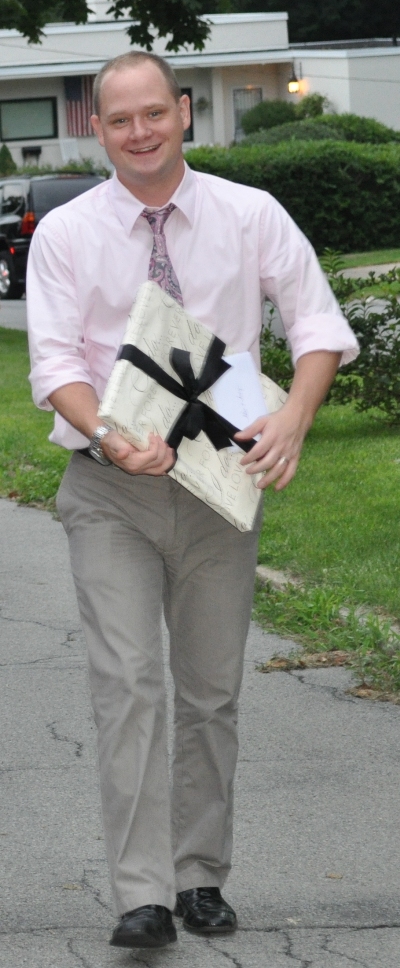
That it was a straight man who so eloquently portrayed our love was proof that this battle for acceptance and equality is one that both gay and straight people will need to take up. But more than that, it cemented Skip’s status as a close friend, one whom I respected both for his heart, as well as his talent. In addition to the occasional foray into poetry and sculpture, Skip is perhaps best known for his stand-up comic skills, having performed from Broadway Joe’s to Waterworks. He’s got an uncanny knack for impressions, and his humor is both smart and sly, clever and witty. Like many comedians, however, Skip is capable of, and often prone to, going dark at times. Not just bad-mood dark, but a darkness that overtakes days and sometimes longer stretches of time. He’ll disappear from FaceBook or the comedy clubs, only to return – re-energized, reinvigorated – with a kick-ass stellar set, and then he’ll be gone again.
Though he claims that nothing embarrasses him, he has a certain undisguised sensitivity in the way the world can hurt people, himself included ~ it’s a heightened sensitivity that goes hand-in-hand with an empathy and understanding of the bullied and the oppressed. When asked how he would address someone who was looking for some way to survive, he offers the following:
“To me the answer is painfully simple yet very difficult for one to accept. At the end of the day it all boils down to understanding, knowing undoubtedly and accepting fully one simple sentence: It’s not you, it’s them. Every time I hear a story about a young person committing suicide because of bullying, I feel a deep swell of utter pity. I pity that they never had a fighting chance. As I said earlier, having a clearly and confidently defined sense of self is one of the keys to a fulfilling life. If you know who you truly are and you can love that person truly then life can be joyful. I imagine a poor soul who is tortured because they are meant to feel ashamed of their identity. I wish that in every instance there was someone who could have said, “You are good and you are worthy and you are loved and you are not wrong for feeling whatever it is that you feel.” Because I’ve enjoyed the great fortune of being surrounded by those who fostered me to be whoever I wanted to be, it is difficult to imagine feeling anything other than support by those closest to me. What a fortified and solitary existence that must create, surrounded by walls of defense and self doubt. Why are there not enough of us who can recognize this and say to them, “It is not you. It is them.” You are not wrong or sinful or ugly or less because someone has told you that. When someone tells you that it is because they themselves are afraid and angry. What you are, in fact, is better. You are better than someone who would turn you on yourself in hateful judgment. You are better than you believe yourself to be. Someday in the future you will look back and feel angry that you ever felt this way because you will be proud of, and have faith in, yourself. You just need to know that it is not you, it is them. To live with constant self-doubt and self-hate is what I imagine to be a dark place. And I imagine that coming out of that place, as it were, must take a warrior’s courage. To risk everything on the chance to simply be okay with yourself is a courageous and, I imagine, frightening endeavor. We’ve progressed as a culture where being different and unique is significantly more accepted than it was as little as a generation ago… but it is still a monumental task.”
“I have never had to experience what the weight of that doubt and fear and shame feels like… but I can imagine. And that is why I have the utmost respect for anyone who has had the courage to openly admit their sexuality and also for those struggling to find it.”
Skip makes an interesting analogy of homophobia being the real disease, not homosexuality. He turns the traditional notion of equating gay people with those having an affliction on its head, reversing that vulgar thought. It highlights an important social construction: the problems that many gay people have may not be a failing in the fact that they’re gay, but a failing in the way the world treats them. It’s not being gay that’s killing these kids, it’s the hatred heaped upon them for being gay that makes them kill themselves.
“A friend by definition is someone who you’ve chosen to be company, someone who shares similar ideals and values and someone who’s of value to you as a person,” Skip explains. “Anything that affects that person is something that you should feel by proxy. Say for instance you have a friend who has been diagnosed with a disease such as cancer or Multiple Sclerosis. You’re naturally inclined to learn more about it and become a proponent for its eventual cure. You do this because though its effect on you is indirect, it is still something that means something to you because it means something to them. In this regard, I feel like having several close gay and lesbian friends certainly influences my actions and beliefs. The disease analogy is apt here because my friends do suffer from a disease. Not the disease of their sexual orientation as some segments of society would have you believe. Rather, they all are crippled with the disease that is the intolerance and contempt of a society who, by and large, forces them to be labeled, categorized, identified as different and deemed unworthy of basic rights. It is not their own diagnosis, but the diagnosis of a sometimes hateful society, which nonetheless has symptoms and complications. It is for this reason that I choose to, in much the same way that a friend of someone who has cancer would, speak and actively seek to find a cure. I don’t want to cure my friends of gayness (because a world without gays and lesbians would suck big time). I want to cure others of misguided ignorance and unsubstantiated fear.”
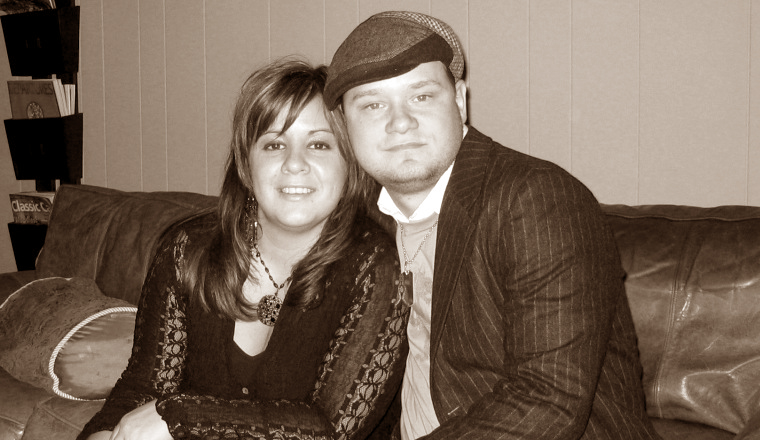
The first time I met him in person was at one of my holiday parties. He arrived with his wife Sherri (then his girlfriend), one of my co-worker friends whom I trusted implicitly not to bring riff-raff into my home. He wore a snazzy newsboy cap and pin-stripe jacket ~ semi-metrosexual bordering on a then-hipster style. Greeting him in red tulle and matching spray-painted hair, I didn’t really have a fashion-leg to stand on – it was my Venetian Vanity party after all. (Insert Skip’s disparaging Cyndi Lauper hair quip here.) As the evening unfolded, I was impressed and ultimately won over by his wit and limitless knowledge of useless trivia and entertainment facts, underscored by a self-effacing sense of humor and a sensitivity hidden just below the surface.
While he embraces, sometimes ironically, a well-tread suburban dream, one gets the sense that part of him yearns for more. At his soul, he has an artistic temperament, and it finds expression like most artists ~ in the unlikeliest of places and moments, and in any way possible ~ the aforementioned plaster reproduction of a sports plaque, a quirky color on the basement man-cave wall, an uproarious FaceBook post that comes out of nowhere, or the gift of a poem for a wedding.
When Sherri later mentioned how happy he was that I had approved of his outfit, something touched me on a deeper level. That’s when I realized that straight guys were just as insecure as gay guys, and required as much, if not more, validation. In that small sliver of a moment, a mind-set was changed, altered forever after, and straight men were suddenly a lot less scary to me.
In the ensuing years Skip and I forged a sometimes unlikely friendship, with occasional dovetail moments like a shared love of ‘Wicked’ and the Red Sox, and I recognized in him a sort of boundless creativity somewhat tempered by his stereotypical role in the world. Straight guys yearn to be more than just ‘straight guys’ as much as gay guys yearn to be more than just ‘gay guys’. The binding constraints of stereotypes cut into everyone. We each found ways of breaking through such limiting bounds by pushing against the confines that society wanted so badly to impose upon us. In our shared quest for creative fulfillment there exists a commonality that transcends sexuality. It is upon this common ground that our friendship is based.
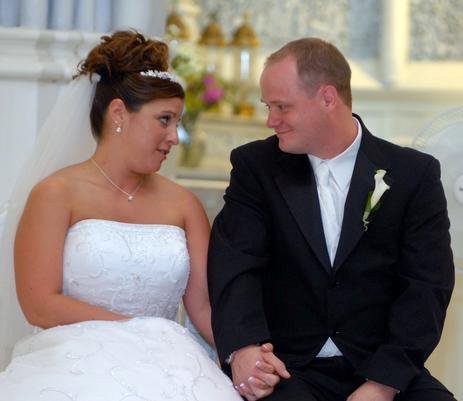
Yet we can’t get around the fact that being friends with a gay guy and acting as a straight ally continues to raise questions of one’s own sexuality. There will always be those who assume and believe that any brush with gay issues instantly makes one gay as well. The absurdity of this is not lost on Skip, nor does it bother him.
“I’m sure that there have been people that have thought I was gay on a number of occasions,” he surmises. “One girl I worked with was convinced I was mostly because I wore suit jackets every day for the first week at the job. And I’ll admit that I can see how a guy who openly sings show-tunes and ranks ‘The Birdcage’ among his favorite comedies is someone who you might question. If they think that, it’s not because I’ve showed the slightest inclination towards finding the male physique the least bit enticing. It’s just not the way that my clock ticks. I knew I liked girls from around the time that I kissed my neighbor, a cute Japanese girl named Shawna, when I was about 5 years old. Or when I stumbled upon my first Playboy and tried to understand what that new found warm tingling feeling was. They think that because I fit some external stereotypical profile that they’ve set up on “who’s gay” based on a bunch of factors that have nothing to do with sexual preference.”
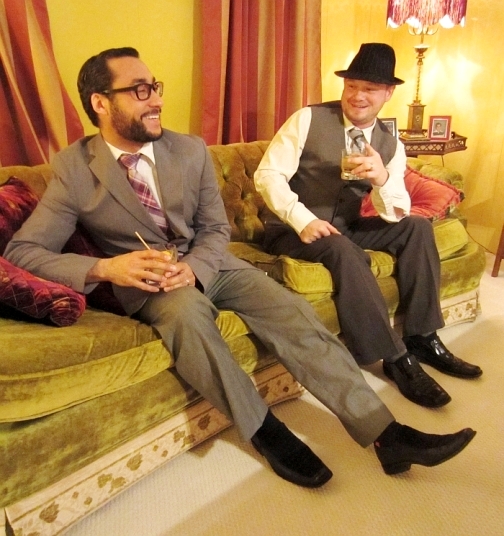
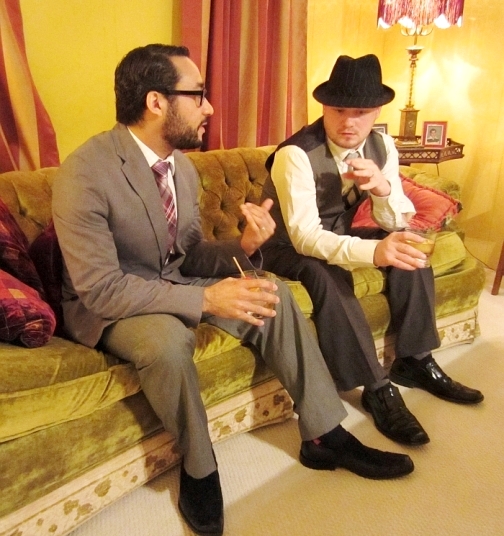
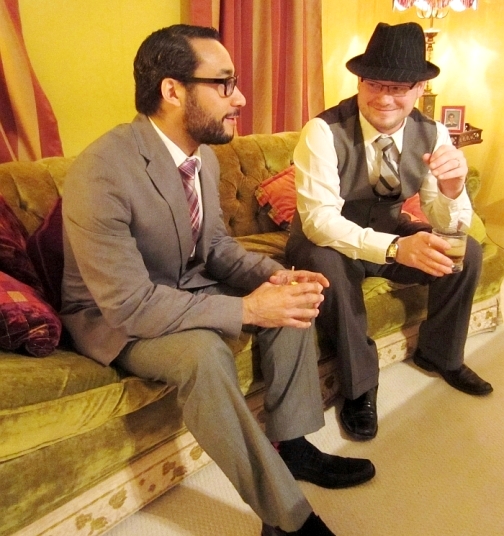
“I think that often, maybe not always but often, the negative reaction someone has to being called something that they are not is a by-product of the internal fear that maybe they are. So when I read a message board boasting that someone is afraid that a young boy watching two boys kiss on ‘Glee’ will give them gay inclinations I have to just shake my head. Watching two boys kiss when I myself was a boy would illicit no reaction other than perhaps an odd curiosity. It certainly wouldn’t have given me any kind of response based on desire. I feel like when someone indicates that they feel differently than that, like watching this would confuse them or persuade them towards similar exploration, it always makes me wonder how shaky their own sexual inclinations might actually be. I have no issue with someone who could feel a hormonal or sexual response from this type of stimuli and thinks that it could be enticing. I just think that when you suggest that it’s a possibility then you’re announcing something to the world that maybe you didn’t intend if you get my drift. Socrates said that, “From the deepest desires often come the deadliest hate.””
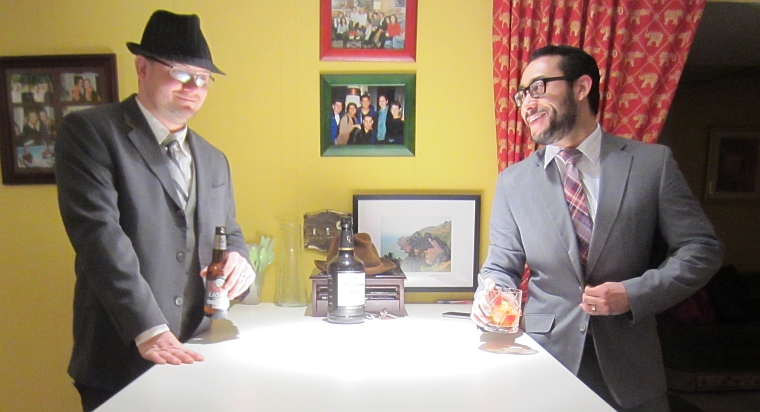
Skip is able to laugh off some of his stereotypically gay traits, but sagely reasons that those traits really have nothing to do with sexuality at all. It’s a reminder that pertains to everyone, and when I took the time to truly think about it, it was startling in its resonance. “I joke about being a “few steps away from being a gay man” because it’s my way of playing off of some people’s misguided perception of me based on what I like,” he explains. “These perceptions seem always to be based off of someone noticing my proclivity for show tunes, my desire to have the interior of my living space present nicely while colors co-ordinate and decorations flourish, my yearly joy during the Oscar Awards or my unabashed love of all things Gaga. To them, these are the things that they consider to be “red flags.” It never ceases to amaze me that the things that make me “a few steps away from being gay” are things that have literally nothing at all to do with sexual preference. They’re just the things I like. And they’re the things that I’ve always liked.”
Such stereotypes run along the same lines of limited reason that makes some people question whether all straight allies are gay. Fortunately, that kind of ignorance is dying out, whether they want to believe it or not. Future generations have made it clear that being gay does not matter to them. They will continue to operate and vote with that in mind. The world is catching up to the fact that marriage equality is one of the last human rights not being afforded to everyone. Righting inequality is never an easy or quick task, but it feels like we are on the tipping point. The next generation will continue this, and largely because of people like Skip ~ and the children he is raising (even if his propensity for crafting a serviceable French braid in his daughter’s hair raises more eyebrows).
“Having a daughter has seemed to only make people’s questions multiply,” he claims. “I can braid my daughter’s hair, I help her make changes to her various dolls’ wardrobes to enhance their “fashion” (as she likes to put it) and I often serve as the “Reigning Queen” for her tea parties. I do this because it’s what she likes and I like playing with her and having fun. I also do this so that she knows that in this big wide world she’ll experience with age that she’ll run into boys who like dresses and girls who like flannel shirts… and that just makes them different and unique, which are traits that I want my daughter to value in others and even strive for herself.”
It is here where Skip’s value as a straight ally is most admirably pronounced. His greatest accomplishments won’t be in teaching me sports or HTML, but in raising his daughter and son to be loving and accepting of all people. It’s not only a boon to the world as a whole, but to his kids as well. Those who don’t open their children’s minds to the possibility of difference do them a grave disservice in preparing them to be successful and productive members of society. That’s what’s always confused me about those who indoctrinate hate and dissension into their children: those kids are going to grow up unable to successfully navigate a diverse world, trapped by the shackles of ignorance and held back by an inability to get along with others.
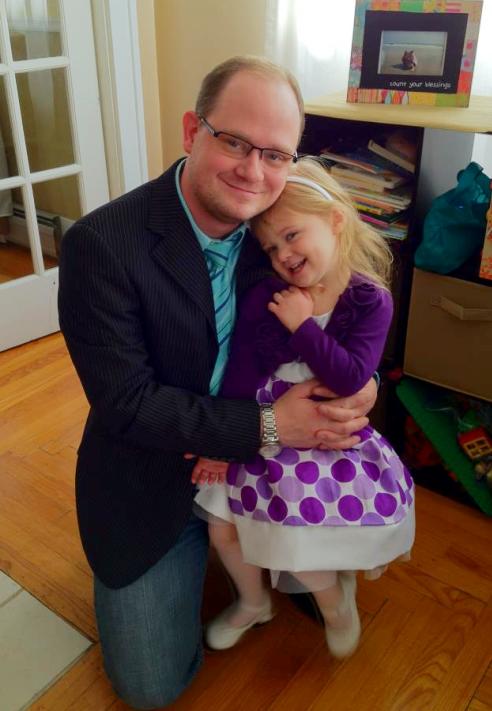
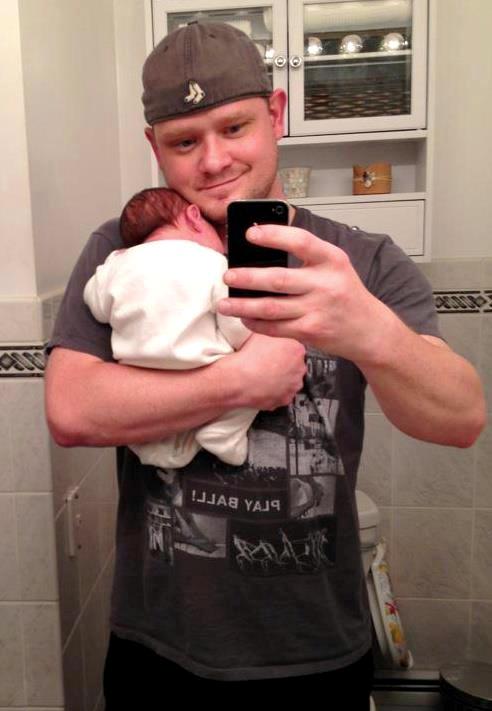
Skip and Sherri are giving their children the best start in life, teaching them how to love, and instilling a sense of what it’s like to be loved. Fittingly, that’s where this story ends ~ with the future. Skip’s legacy will be two more people who don’t see difference as a bad thing, but who accept and embrace it as something of value. He is teaching them to be inquisitive and open, accepting and non-judgmental. It is the basic tenet of a straight ally. That sort of thing will always move me. It’s one thing to say you’re my friend ~ it’s quite another to put your actions behind it.
He closes with a succinct summation: “If you feel that something as simple as one single trait (of the countless traits that make up a person), the bio-chemically predetermined factor of a human being’s sexual preference, is a tool which you can use to judge or admonish them, then I say that you are either woefully misinformed… or that you are yourself, at heart, simply not a good person. Life is far too short, and is already fraught with far too many heartaches. No human being should waste a solitary thought nor spend a single breath in attempt to make another human being doubt or lament their own identity. Nor can anyone truly believe in earnest that they are afforded a right with which to wrestle, from another, a right which is inalienably theirs. Love, no matter what manifestation it may be found, is the most precious commodity we have on this earth. Don’t shit on it; lest progress and history shit on you.”
His words ring with the blunt edge of inevitable change, the charged future for a better world. It is the sound of a dying branch of shame finally breaking off in the winds of righteousness, the reclaiming of a religion twisted and abused in the name of hatred, and the last gasp of an irrational and unreasonable group of people afraid of anything different. It is a clarion call for honesty, for being the people we were born to be ~ a demand for acceptance, for equality, for every individual to be afforded the right to love. It is, at its heart, the wish and hope and dream of a better world.
“I believe that there are far too many people who spend time trying to present an image to the world, constantly manicuring a representation of what they think people want or expect to see while never exploring or developing the person they actually are. The moment that you’ve handcuffed perception with identity is the moment that you’ve censored both your voice and your beliefs.”~ Skip Montross



